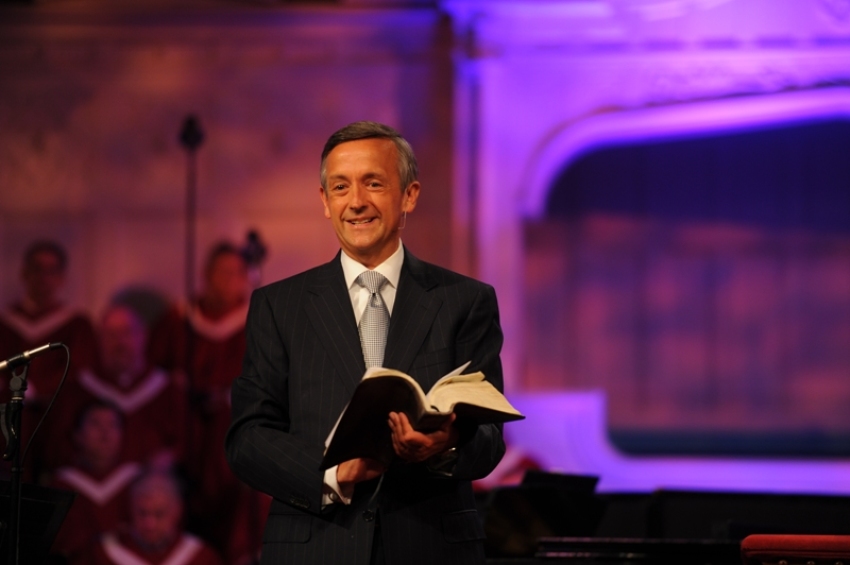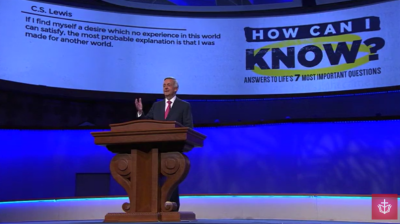How can we know Christianity is the 'right' religion? Robert Jeffress answers

With many religions claiming to provide a path to our Creator and the promise of life after death, how can Christians confidently assert that Christianity is the "right" faith?
That’s the question Pastor Robert Jeffress of First Baptist Dallas sought to tackle with his new sermon series "How Can I Know?" in which the longtime pastor asks one of life’s fundamental questions: can we prove (or disprove) the existence of God?
While acknowledging that “proving God's existence remains elusive,” Jeffress emphasized the substantial volume of evidence supporting belief in a divine Creator, citing the complexity of the universe and personal experiences of faith.
“God has His fingerprints all over this universe,” he said in his message on Sunday. “As you look at the existence of matter, the design that you see throughout the universe, the existence of man, the experience of millions of people who have found God even when they weren't looking for Him, there is strong evidence for the existence of God.”

The next logical question, then, Jeffress continued, is whether “Christianity is the right religion.” The pastor pointed to some who argue that insisting on a single truth is “intolerant,” while others maintain that genuine tolerance respects the freedom to believe, rather than equating all beliefs as equally valid.
“Some people say that it's unnecessary to claim there is a right religion,” he said. “They argue that all world religions teach basically the same thing. The only people who believe that are those who've never studied world religions.
Jeffress said not only does the existence of thousands of religions prove that they are not all teaching the same thing, but even the suggestion that Christianity is exclusive in its claims can prove troubling to many people.
“There are now 8 billion people on this planet, but only 2.2 billion can be categorized as Christian, primarily from so-called Christian nations,” Jeffress said. “The actual number of true Christians is likely much smaller. Even if you accept the 2.2 billion figure, that means nearly 6 billion people have embraced the wrong religion and will spend eternity separated from God.”
Jeffress outlined four key factors that distinguish Christianity from other faith traditions, focusing on the “uniqueness of Jesus Christ.” Unlike other religious leaders, Jeffress said, Jesus made specific claims of deity, asserted His ability to forgive sins, and predicted His resurrection — each claim supported by historical context and Scripture.
He also highlighted the evidence supporting the resurrection of Jesus Christ, emphasizing that “the tomb is still empty today, 2,000 years after the crucifixion.”
“If anybody wanted to find that body, it would have been the Romans and the Jewish leaders who wanted to discredit Jesus' claims,” he added.
Jeffress also pointed to Jesus' unique claims compared to other religious figures.
“Even if you doubt a resurrection occurred, Jesus is the only religious leader who claimed He would be able to conquer death,” he explained, citing Jesus’ own prediction of His return to judge the world, adding, “No other religious leader made that grandiose claim.”
The pastor also went through a number of other key passages in which Jesus made claims of a future judgment which He alone would administer: referencing Matthew 25:31-32, better known as the Judgement of the Sheep and the Goats, Jeffress said this promise carried with it a critical distinction.
“Every other founder of a religion said that if there is a judgment, people will be judged by their acceptance or rejection of the god of that religion. No founder of a religion or a human being said people would be judged by their acceptance or rejection of the founder,” he said. “It would be the Founder's God.
“But Jesus was different. Jesus said I'm coming back to judge the world, and the basis of that judgment will be either their acceptance or their rejection of Me.”
Jeffress repeatedly underscored the exclusivity of the claims of Christ.
“Jesus didn’t teach that all religions are like different pathways up the same mountain,” he said, pointing to Matthew 7:13-14 in which Jesus described two roads: one narrow, leading to life, and one broad, leading to destruction.
The message culminated with a stark warning from Jeffress, who said he often hears from members of his congregation on the exclusivity of Christ and the topic of eternal salvation and a question that goes like this: “Pastor, if faith in Jesus is the only way to Heaven, think about all of the people who are missing that way to Heaven … how could so many sincere people be wrong?”
Jeffress said religious sincerity, however well-intentioned, isn’t worth more than the blood of Christ.
“You can be sincere, but you can be sincerely wrong,” he said.



























